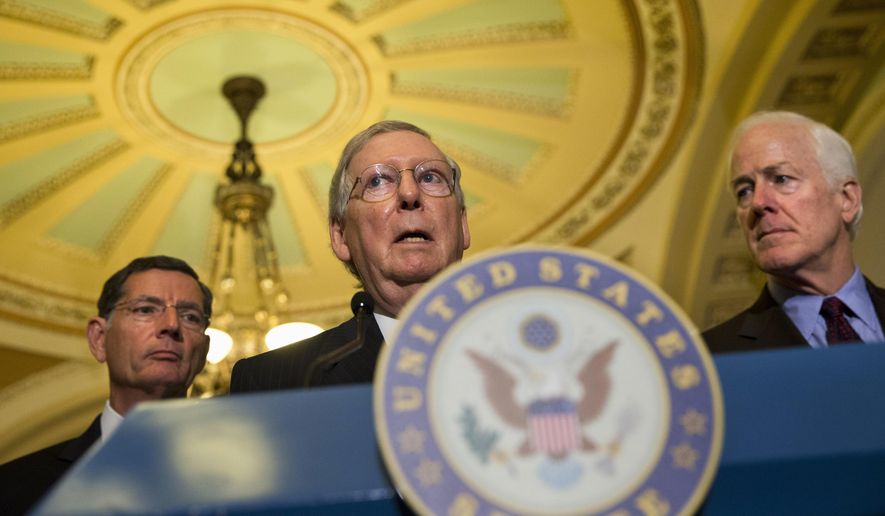A bid by Republican Senate leaders to strip funding from Planned Parenthood failed Thursday when eight Republicans joined Democrats to filibuster the move, dooming conservatives’ hopes of forcing a shutdown showdown with President Obama over the fate of the abortion provider.
Supporters mustered 47 votes for their bill — well shy of the 60 needed to overcome the filibuster — and Majority Leader Mitch McConnell, Kentucky Republican, quickly pulled the Planned Parenthood fight from the floor and proposed a “clean” bill to fund basic government operations into the next fiscal year without any ideological strings attached.
A final vote is expected next week. The bill then will shift to the House, where Speaker John A. Boehner, Ohio Republican, will have to round up enough votes to pass the measure before Thursday, when the next fiscal year begins.
Without a funding bill, the government would go into a partial shutdown with both sides angling for political advantage.
“Every moment Republicans squander on pointless votes brings us close to an unfunded federal government,” said Senate Minority Leader Harry Reid, Nevada Democrat. “Wasting time also leaves a void for shutdown advocates.”
The Planned Parenthood fight has been building for weeks, spurred by a series of undercover videos shot by the Center for Medical Progress that appear to show Planned Parenthood officials negotiating the sale of fetal tissue to be used for medical research. Such sales are legal only if they aren’t for profit.
The videos have shocked Republicans and energized pro-life forces, who immediately began calling for an end to taxpayer money that flows to the organization — even though federal money generally cannot go to pay for abortions. Instead, the group receives government money as grants or contracts to perform other women’s health care services.
Mr. McConnell proposed shifting some $235 million from Planned Parenthood to other community and women’s health care organizations over the next year, saying questions about the videos need to be answered before Planned Parenthood is funded again.
President Obama vowed a veto to protect Planned Parenthood, and eight Republicans joined all but one Democrat in the Senate in rejecting Mr. McConnell’s bill — though for varying reasons.
Some Republicans said the fight was futile. Others rejected budgeting by stopgap bills, saying Congress needed to pass full-year funding for programs.
“I’d rather it defund Planned Parenthood, but if the votes aren’t there, I don’t see the point of having a standoff,” said Sen. Roger F. Wicker, Mississippi Republican and head of the party’s 2016 senatorial campaign.
Sen. Tom Cotton, Arkansas Republican, objected to the size of the defense budget. He said it was too low given the commitments the U.S. has made in the war on terrorism and the rise of the Islamic State, also known by the acronym ISIS.
“Today, our Navy cannot keep an aircraft carrier in the Persian Gulf, our Army and Marine Corps are losing thousands of battle-hardened troops to forced retirement, and our Air Force is flying the oldest and smallest fleet in its history,” he said. “Put simply, our military is at its breaking point as it attempts to respond to proliferating threats around the world from terrorist groups like ISIS.”
Sen. Ted Cruz of Texas, a Republican presidential candidate and one of the key forces pushing to use the spending bill to halt Planned Parenthood funding, said his colleagues had caved.
“What the Republican Party has accomplished is passage of the Democratic agenda,” Mr. Cruz said.
Mr. McConnell vowed to avoid a government shutdown, giving up the leverage Mr. Cruz hoped to use. Mr. McConnell’s bill would fund government through Dec. 11, which would set up another deadline in a little more than two months.
With majorities in both chambers of Congress, Republicans should have had an easier time with spending bills this year. They passed a unified budget for the first time since 2009 and began working on the 12 individual bills to carry out the budget.
But internal Republican disputes over the size of defense spending and how far to press ideological issues sidetracked those budget bills, and Democrats flexed their filibuster powers in the Senate.
Democratic leaders say they won’t allow any increase in defense spending unless Republicans agree to an equal increase in domestic spending, which would break the spending limits set in the 2011 debt deal.
Mr. Obama and his lieutenants on Capitol Hill have demanded that Republicans scrap the budget passed earlier this year and enter into negotiations on raising taxes and spending.
Mr. Cruz said Thursday that Mr. Reid and House Minority Leader Nancy Pelosi, California Democrat, are outmaneuvering Republicans on Capitol Hill despite losing their majorities in both chambers.
“I think we need Republican leadership that actually leads,” he said.
Even if Mr. McConnell gets a bill through the Senate, House Republican leaders will face a challenge.
A senior House Republican aide said leaders discussed their options Thursday, including a tool known as budget “reconciliation” to defund Planned Parenthood and remove it from the immediate spending fight.
Leaders will present their plan to rank-and-file House Republicans at a party meeting Friday morning.
• Tom Howell Jr. can be reached at thowell@washingtontimes.com.




Please read our comment policy before commenting.